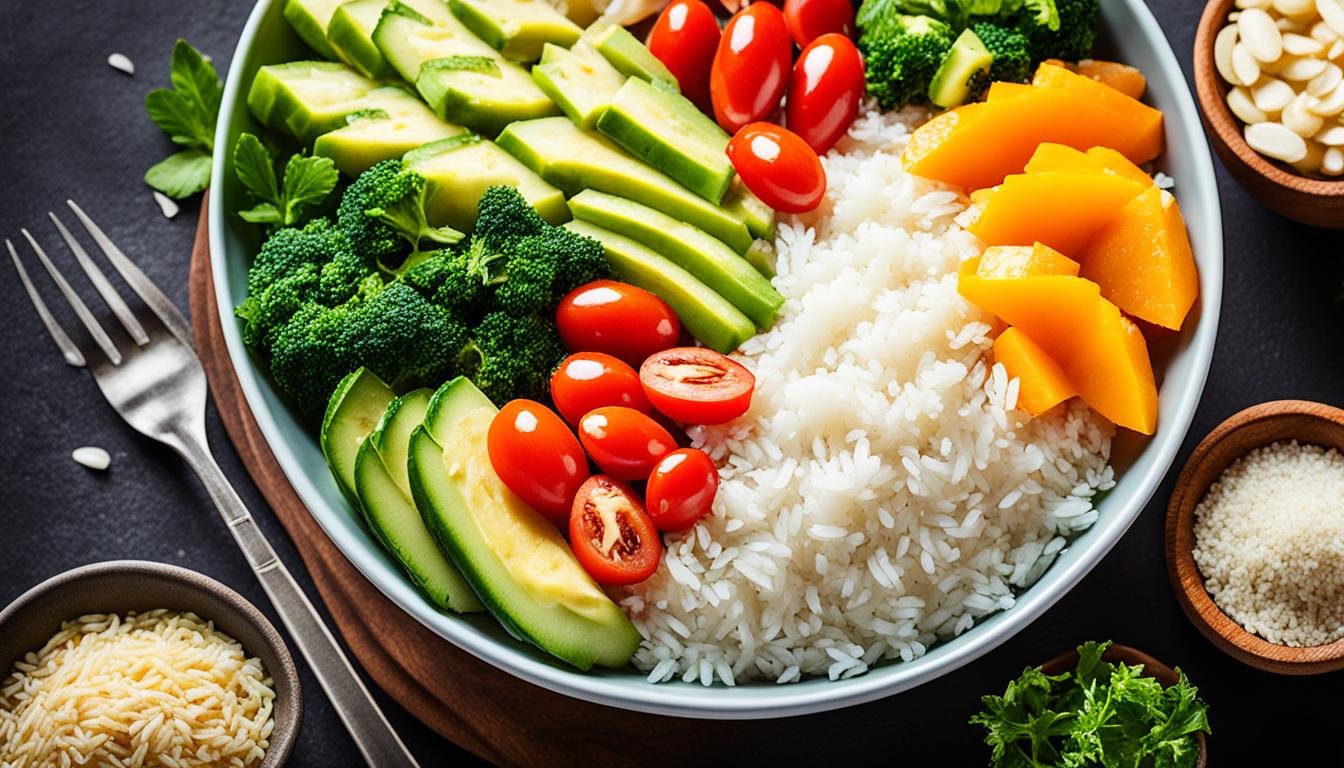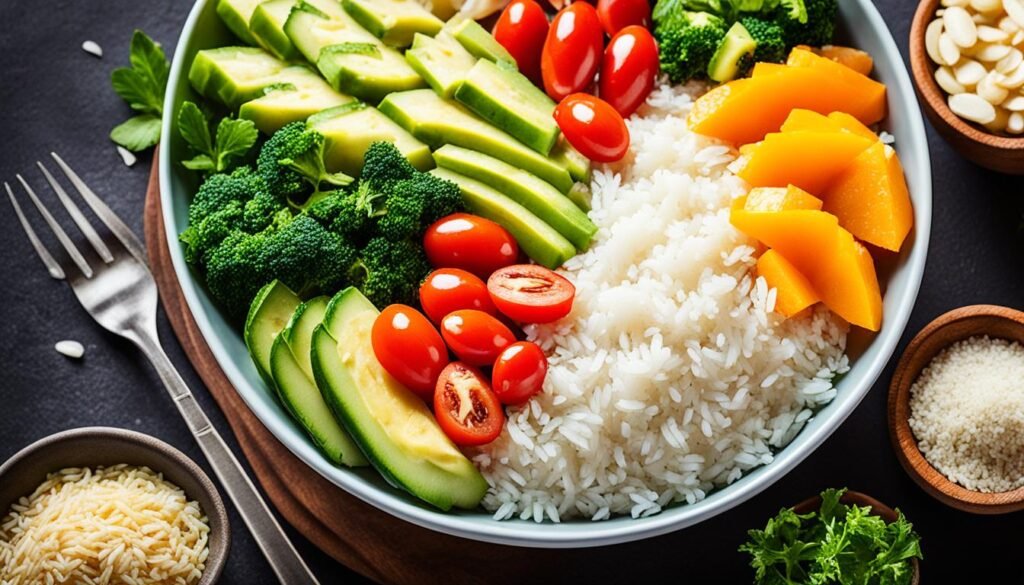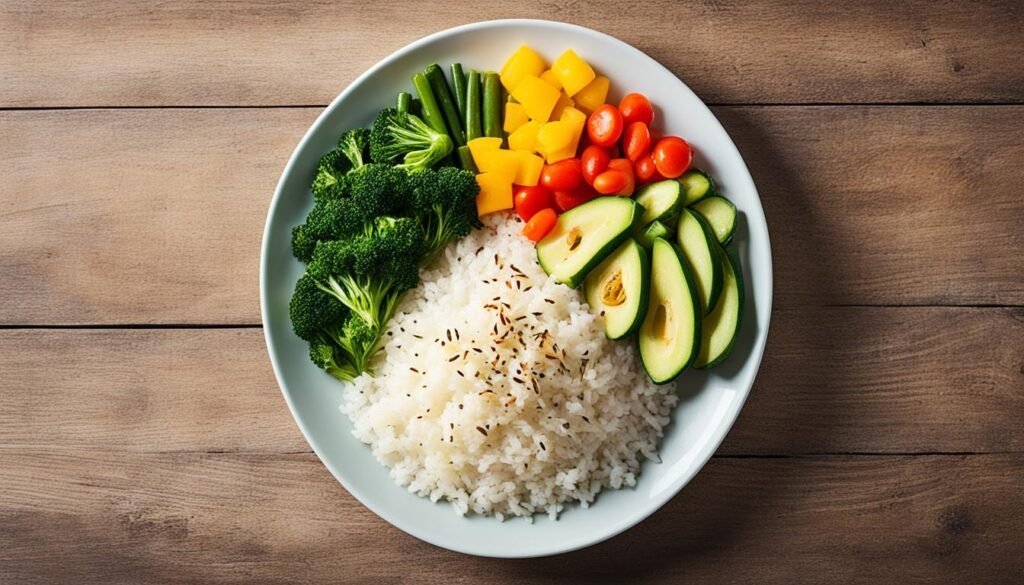Get our FREE E-Book HERE - 120 TIPS for Losing Weight & Bonus Tips for Postpartum Weight Loss & Dad’s Postpartum Experience
Is Jasmine Rice Good for Weight Loss?

Have you ever found yourself on a weight loss journey, searching for that perfect addition to your diet that can both satisfy your taste buds and support your goals?
Well, let me introduce you to jasmine rice. This fragrant and flavorful grain is not only a culinary delight but also a potential ally in your weight loss efforts.
Picture this: you come home after a long day, craving a comforting meal that won’t sabotage your progress. The aroma of jasmine rice fills your kitchen, instantly transporting you to a peaceful oasis. As you take that first bite, the delicate grains melt in your mouth, creating a satisfying texture that leaves you feeling nourished and content.
But is jasmine rice good for weight loss? Can it be a healthy addition to your diet? Let’s dive deeper into the nutritional qualities of jasmine rice and explore how it can fit into your weight loss journey.

Key Takeaways:
- Jasmine rice can be a flavorful and satisfying addition to a weight loss diet.
- Its delicate aroma and fluffy texture make it a culinary delight.
- Jasmine rice is low in fat and high in complex carbohydrates, providing sustained energy.
- It is a good source of vitamins and minerals that support overall health.
- Incorporate portion control and balance with other nutritious ingredients for optimal results.
Understanding Jasmine Rice: An Introduction to the Fragrant Grain
What is Jasmine Rice?
Jasmine rice is a type of long-grain rice that is known for its fragrant aroma, which resembles that of the jasmine flower. It originated in Thailand and is now commonly grown in many Southeast Asian countries.
Jasmine Rice vs. Regular Rice: A Nutritional Showdown
When comparing jasmine rice to regular rice, there are notable differences in nutritional profiles, taste, and texture. Jasmine rice has a slightly sweet and floral flavor, while regular rice tends to have a more neutral taste.
In terms of texture, jasmine rice is softer and stickier when cooked, making it ideal for dishes like stir-fries and sushi. Regular rice, on the other hand, can vary in texture depending on the variety, with some being more firm and separate when cooked.
Also read: Foods to Eat When Pregnant and Nauseous
Distinct Characteristics and Uses of Jasmine Rice
One of the distinct characteristics of jasmine rice is its fluffy texture. It has a light and airy consistency that pairs well with various cuisines. Jasmine rice also has the unique ability to absorb flavors, making it an excellent choice for dishes such as fried rice or pilaf. Its fragrance enhances the overall eating experience, adding a delightful aroma to any meal.
Nutritional Benefits of Jasmine Rice in Your Diet
Jasmine rice not only delights our taste buds with its aromatic flavor but also offers several nutritional benefits that make it a great addition to a healthy diet. In this section, we will explore the calorie count and macronutrient profile of jasmine rice, the role of fiber in weight management, and the essential micronutrients it contains.
Calorie Count and Macronutrient Profile
When it comes to weight loss, understanding the calorie content and macronutrient profile of the foods we consume is essential.
A 1-cup serving of cooked jasmine rice contains approximately 238 calories. It is primarily composed of carbohydrates, with around 53 grams per serving.
Additionally, jasmine rice provides small amounts of protein and virtually no fat, making it a lighter option compared to other rice varieties. Incorporating jasmine rice into a balanced weight loss diet can provide a source of energy while keeping your calorie intake in check.
The Role of Fiber in Weight Management
Fiber plays a crucial role in weight management and overall health. It promotes satiety, helps regulate digestion, and assists in maintaining a healthy weight.
Jasmine rice contains a moderate amount of fiber, with approximately 2.3 grams per 1-cup serving. Including fiber-rich foods like jasmine rice in your meals can help you feel fuller for longer, preventing overeating and aiding in weight loss efforts.
Micronutrients and Their Impact on Health
Along with its macronutrient content, jasmine rice also provides essential micronutrients that contribute to overall health and well-being. These micronutrients include vitamins and minerals such as niacin (vitamin B3), thiamin (vitamin B1), manganese, and selenium.
These micronutrients support various bodily functions, from energy metabolism to immune system functioning. Incorporating jasmine rice into your diet can help ensure you’re getting these important micronutrients, contributing to your overall nutritional needs.

In the next section, we will address the question of whether jasmine rice is indeed good for weight loss, providing a comprehensive answer based on available evidence and research.
Is Jasmine Rice Good for Weight Loss?
In this section, we will address the question of whether jasmine rice is indeed good for weight loss. We will review the evidence and research surrounding the use of jasmine rice in weight loss diets, and provide a comprehensive answer to this common question.
Jasmine rice has been a topic of interest for those looking to lose weight. Its unique properties and nutritional composition make it a potential ally in your weight loss journey.
Research suggests that jasmine rice can be beneficial for weight loss due to several reasons:
- Low in fat: Jasmine rice is naturally low in fat, making it a healthier alternative to many other rice varieties.
- Rich in fiber: Fiber plays a crucial role in promoting satiety and regulating digestion. Jasmine rice contains a good amount of dietary fiber, which can help you feel full for longer and prevent overeating.
- Provides energy: Jasmine rice is a good source of carbohydrates, which are the body’s primary source of energy. Consuming jasmine rice can provide you with the energy needed for physical activity and support your weight loss efforts.
- Complements a balanced diet: When combined with a balanced diet that includes lean proteins, fruits, and vegetables, jasmine rice can be a healthy addition that adds variety and flavor to your meals.

However, it’s important to note that weight loss ultimately comes down to creating a calorie deficit, which means consuming fewer calories than you burn.
While jasmine rice can be part of a balanced weight loss diet, portion control, and overall calorie intake should also be considered.
Striking a Balance: Incorporating Jasmine Rice into a Weight Loss Diet
When it comes to weight loss, finding a balance is essential.
Incorporating jasmine rice into your diet can be a great way to enjoy a delicious and satisfying grain while still working towards your weight loss goals.
Portion Control and Serving Suggestions
One of the key factors in weight management is portion control. While jasmine rice can be a healthy part of your diet, practicing moderation and mindful eating is important. Here are some tips for incorporating jasmine rice into your meals:
- Measure your servings: Use a measuring cup to portion out the right amount of cooked jasmine rice. A typical serving size is 1/2 to 1 cup.
- Pair it with vegetables and protein: Create a well-rounded meal by adding plenty of colorful vegetables and lean protein sources like grilled chicken or tofu.
- Opt for jasmine rice as a side dish: Instead of making jasmine rice the main focus of your meal, use it as a side dish to accompany flavorful stir-fries or healthy curries.

Comparing Jasmine Rice to Other Whole Grains
While jasmine rice offers its own unique flavor and texture, it’s worth exploring other whole grains to diversify your weight loss diet. Consider the following options and their benefits:
- Brown rice: Rich in fiber, vitamins, and minerals, brown rice offers a nutty flavor and chewy texture.
- Quinoa: A complete protein source, quinoa is packed with essential amino acids and is gluten-free.
- Barley: This hearty grain contains fiber, vitamins, and minerals, and adds a satisfying chewiness to dishes.
By incorporating a variety of whole grains into your diet, you can enjoy different flavors and nutritional profiles while still maintaining a focus on weight management.
Recipe Ideas for Healthy Weight Management
Adding jasmine rice to your weight loss diet doesn’t have to be boring or repetitive. Get creative in the kitchen with these recipe ideas:
- Jasmine rice salad with colorful vegetables and a light dressing.
- Stuffed bell peppers with jasmine rice, lean ground turkey, and spices.
- Jasmine rice stir-fry with plenty of vibrant vegetables and a protein of your choice.
Remember to control your portion sizes and incorporate a variety of vegetables and lean proteins to create balanced and nutritious meals.
Conclusion
In conclusion, jasmine rice can be a valuable addition to a weight loss diet. Throughout this article, we explored the potential benefits of jasmine rice for weight loss and discussed its nutritional qualities.
To incorporate jasmine rice into a balanced weight loss diet, it’s important to practice portion control and pair it with other nutritious ingredients. By being mindful of your serving sizes and incorporating a variety of vegetables and lean proteins, you can create satisfying and nourishing meals.
Ultimately, the success of your weight loss journey depends on a combination of factors, including a calorie deficit, regular exercise, and mindful eating habits.
While jasmine rice can be a healthy and delicious choice, it should be part of an overall balanced diet and lifestyle.








